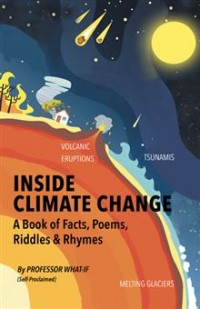Title: Inside Climate Change: The Book of Facts, Poems, Riddles, and Rhymes
Author: Professor What-If
Publisher: iUniverse
ISBN: 978-1-4917-9053-3
Pages: 88
Genre: Science, Poetry
Reviewed by: Jason Lolus
Buy on AmazonPacific Book Review
Professor What-If is outraged. He is outraged at the lack of acceptance that climate change is real and needs to be dealt with. The “debate” is over and it is time for change. “What if” we continue to waste time debating the reality of climate change? This novella- sized mix of genres is an interesting combination of what we might call a ecological slam poetry interspersed with statistical analysis and conclusions. It is a call to action and a manifesto of common sense.
The professor shares the experience of his existential awakening and it is one that might also be described as an ecological spiritual awakening. He literally wakes up in the morning with anxiety and knowledge about climate change. It’s as if Mother Earth, like a God, has given him knowledge in his sleep which he then must use to raise awareness about the current climate crisis. The professor’s narrative suggests the intimate connection humanity has with the Earth. His “awakening” is an enlightenment we should all have or strive to experience. We are beyond the debate. Climate change is real. Step one is to acknowledge the problem of greed and replace that practice with a newfound respect and empathy for the Earth. The professor cleverly personifies Mother Earth to symbolize why we should respect the Earth for her sake and our own.
This is not your typical diatribe on climate change. The author sought to produce something more engaging than a dry, “doom and gloom” type of textbook. This is largely a book of poetry, interspersed with facts and challenges to climate change deniers. One of the more interesting comments is about the “ballast” of the Earth. This is part of climate change that does not make the news very often. The vast amounts of fossil fuels we’ve burnt and the warming water have actually led to a tiny shift in the Earth’s axis. In a sense, humanity has disrupted the balance (or ballast) of the Earth and this has led to climate change. Combatting climate change will require a restoration of that balance.
Professor What-If’s outrage is directed at greed in the oil industry. This outrage is reflected in the kind of poetry you might hear at protest rallies. The repeated mantra is that change is required now. For a brief “doom and gloom” moment, Professor What-If ends with a dystopian future in which humanity is relegated to live underground. Is such a vision too hyperbolic? Perhaps, but this is the point. “What” will happen “if” we do nothing about climate change? The drastic weather patterns will only increase and this frightening potential of the problem is what awakened “What-If” and drove him to write Inside Climate Change.



Follow Us